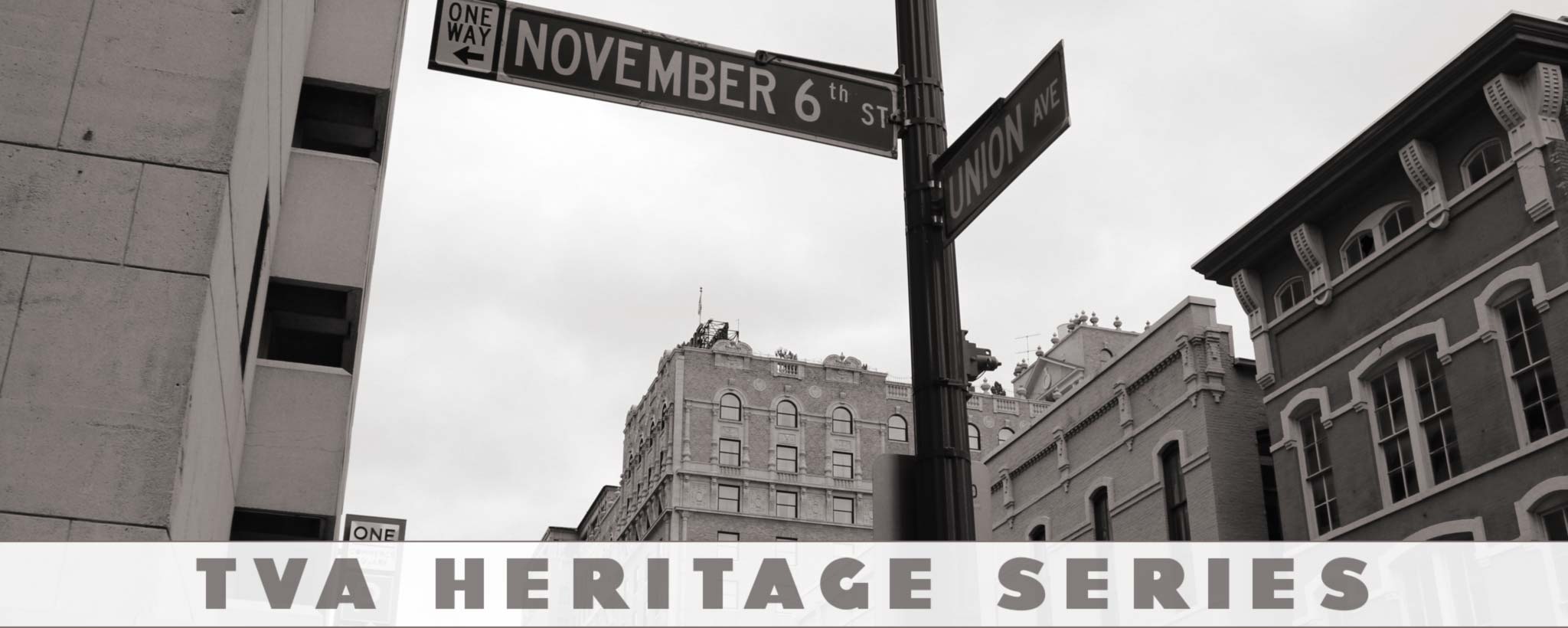
Street of Dreams
Memphis’ Nov. 6 St. stands in honor of the 1934 day the city’s residents voted overwhelmingly in favor of receiving public power — all the benefits that came with it — from TVA.
If you are strolling through downtown Memphis after an especially good barbeque rib dinner, you might come across the street sign: Nov. 6 St. Most people today have no idea of the significance of the sign, much less the date. But 85 years ago in Memphis — and across the Tennessee Valley — the date was a big deal.
November 6, 1934, was the date of the election to determine if Memphians would vote to join the TVA power distribution system.
Memphis, at this time, was the largest city in the state. With a population of over 250,000, it was the world’s largest cash cotton market as well as the world’s largest hardwood lumber market. The local power company supplied the City of Memphis with electricity, but it was expensive. In fact, when Tupelo, Mississippi, was scheduled to receive TVA power in February 1934, the Memphis Press-Scimitar published cost comparisons:
Home size | KWh / month | Tupelo rates | Memphis rates |
5-rooms | 20 | .75 | $1.10 |
6-rooms | 45 | $1.35 | $2.47 |
10-rooms | 116 | $2.82 | $5.98 |
In April of 1934, Memphis officials attended a conference with TVA board director, David Lilienthal. They returned home convinced that TVA power could make Memphis “a great city of prosperous, happy people.” A campaign was soon started to persuade the people of Memphis that they needed what TVA had to offer.
Easing Women’s Work
The Memphis Press Scimitar was extremely pro-TVA, regularly publishing articles and cartoons leading up to the vote. Showing a photo of a gullied hillside, the paper proclaimed that “The TVA is working to save and develop ALL THE SOUTH’S RESOURCES, of which power is only one. If the people of Memphis vote to take TVA power . . . They will vote to bring Memphis into cooperation with the whole beneficent and far-seeing TVA program.”
The paper also published a small column entitled “Why I’m For TVA,” which asked a variety of folks why they wanted TVA power. The responses, while not surprising, are certainly telling. Mrs. Ed Toulon, a housewife, was “100 percent for TVA. TVA means cheaper electricity and cheaper electricity means an electric refrigerator—perhaps an electric stove—and other conveniences for me.” She was not alone as other housewives mentioned running electric fans more in the summer or owning electrical appliances that would make their housework easier. One attorney, Mr. Virgil Fulling, had a broader answer. He was for TVA because he was “for the future prosperity of Memphis” going on to say that “Power is the lifeblood of industry . . .”
Other papers, both nationally and regionally, wrote about the impending vote. The Florence Times opined that “There is probably nothing that would assist this river city more in staging a real comeback against old man depression than the utilization of this cheap power . . . “ At the other end of the state, the Johnson City Press wrote that “Memphis is afire with zeal for TVA power”, wanting the “advantages of cheap power from east Tennessee.” The national magazine, Christian Century, reported that “News not only for the Mid-South but for the entire nation will be made on Nov. 6 when . . . it can be predicted confidently, the city of Memphis will vote to go under the TVA.”
Mutual Interest, Mutual Benefit
While it seemed, at least from what was reported in the papers, most Memphians wanted TVA, it appears the feeling was mutual. TVA wanted Memphis. In the weeks prior to the election, TVA’s top men visited the city on numerous occasions. Arthur E. Morgan, first chairman of TVA’s board, visited Memphis several times prior to the Nov. 6 vote to tout the TVA program as he addressed the Tennessee State Convention of Social Workers as well as the Southeastern & Southwestern Library Associations. Earle Draper, TVA’s director of land planning and housing spoke to the Memphis Rotary championing the TVA savings and stating that “The TVA is just as much interested in Memphis as it is in Knoxville, Chattanooga or any other section of this Valley.”
But it was director David Lilienthal that drew the biggest crowd. Over 2,200 Memphians and west Tennesseans filled up the Ellis Auditorium to hear his speech. After he shared his vision of what TVA could offer to help Memphis grow and prosper, he spoke about TVA’s friends — the farmers, the businessmen, the workingmen and the women of the Tennessee Valley. “Cheap electricity and low cost appliances in the homes mean more to women than to anyone else in the community. The women know that electricity can eliminate the drudgery which has always been regarded as inevitable in the keeping of a house . . . TVA is proud of the fact that the women are supporting it.”
In spite of objections and legal maneuvers by the local power company and its stockholders, the referendum went forth as expected, and the citizens of Memphis voted overwhelmingly (32,623 to 1,858) in favor of TVA power. A few short months later, the vote was memorialized with the TVA street sign near the intersection of Thomas and White. Fittingly, the street’s first resident, the Lloyd O. Fry Roofing Company of Chicago, reflected the economic development message promoted during the election and still relevant today: Cheaper Electricity Will Bring Prosperity.